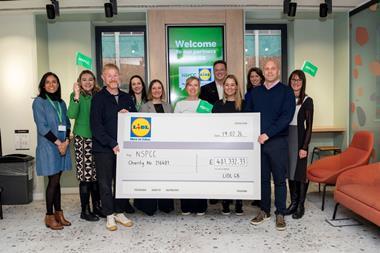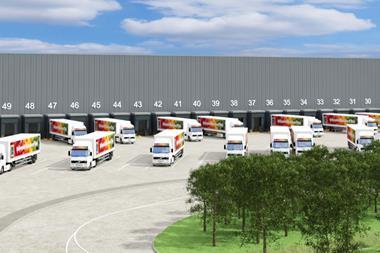Aldi is asking suppliers for a 5% price reduction from the end of the month. What's behind such a drastic move and how likely is it to succeed, asks Peter Cripps
If you're a retailer, don't be a bully. If you're a supplier, don't let yourself be bullied. That was Aldi UK and Ireland managing director Paul Foley's clarion call to the grocery industry at the British Retail Consortium's annual conference in June.
So imagine suppliers' shock when they received a letter less than a month after his speech demanding a 5% cost reduction effective 14 working days later.
Several outraged suppliers rang The Grocer to complain Aldi had resorted to the very same tactics its boss claimed to stand against.
It is undoubtedly a provocative move by Aldi. But with suppliers threatening mutiny, why is Aldi demanding such substantial cuts? Can it really get the terms it wants?
Aldi isn't the first retailer to demand cuts in recent months. Waitrose very publicly called for a 2% cut in prices. And Tesco requested better terms from suppliers in October and again in May when it demanded a price reduction of 3%.
But Tesco has a history of playing hardball with suppliers. Aldi's letter has caused outrage partly because it has a reputation for treating suppliers fairly. "Aldi always negotiates very hard but you would normally expect it to stick to an agreement," says one supplier, who declined to be named.
"You could understand it if this came from Tesco, but you don't expect this from Aldi."
The size of the price reduction has also raised eyebrows. "Five per cent is the entire margin of most own-label suppliers, so it's an ambitious cut to ask for," says Nicola Mallard, an analyst at Investec. Many suppliers say it will simply be impossible for them to reduce their price by 5% and are threatening to "take the nuclear option" by refusing to supply the discounter. They know Aldi uses a relatively small number of suppliers because it only stocks about 1,000 SKUs, and are well aware this means it can't play them off against one another in the way the big four can.
Tony Baines, MD of Aldi buying and author of the offending letter, is unperturbed. Aldi deserves better prices because its "meteoric growth" in recent years means it is offering suppliers increased volumes, he says.
"We are looking to improve our cost base generally," he explains. "Like our competitors we have to fight hard for the volumes we want and to build our market share. Suppliers are very keen for volume and we are one of the few retailers who are able to develop our sales volumes because of our store opening programme. We are adding 10% a year in terms of store numbers so can offer a much higher growth than elsewhere. We are not looking to cut people out, but to work with them."
There are other reasons why Aldi is looking for such drastic cost savings. Six months ago the discounter was the golden boy of the grocery industry. Since then, as Baines' letter admits, its growth has been curbed by the mults, who have ramped up their promotions and pushed their value credentials.
TNS figures show the discounter's growth has slowed rapidly over the past six months, despite the increase in stores. In the 12 weeks ending 28 December, Aldi's sales grew 25.4% compared with the same period the previous year, giving it its highest-ever market share, at 3.2%. In its most recent figures available, for the 12 weeks ending 14 June, its sales had risen by 8.7%, effectively lagging behind those of Sainsbury's and Morrisons. Its market share had also fallen to 2.9%. And for all the criticism of Tesco's discounter range, it now accounts for 2.5% of Tesco's sales, or roughly one third of Aldi's sales.
Keeping up appearances
In response, Aldi is looking for ways to sharpen its price perception, allowing it to attract value-obsessed consumers for whom the discounter craze is no longer a novelty. It has launched its first promotional campaign, called the Big Deal, to flag up its value credentials, featuring "Aldi's biggest deals ever, on sale 2nd July", which Foley expects to be ongoing.
Unsurprisingly, Aldi has not dropped its plans to open a store a week, as its new stores have been part of the reason for its rapid sales growth in recent years. But if sales are slowing, a price drop by suppliers would help free up capital to open more stores.
Aldi may also be under pressure to increase its profits because sterling is weak, which has effectively reduced returns for the parent company. So, even though Aldi has been one of the biggest success stories of the recession, it now finds profits being squeezed when there are big demands for capex.
Suppliers, however, are not happy to soak up Aldi's losses on the currency exchanges and bankroll its expansion plans. Many are threatening mutiny and say they will stop supplying Aldi if the retailer doesn't back down.
Others say that they are able to offer Aldi a reduction in price but nowhere near 5% and that its demands can only be the starting point for negotiation.
Iceland tried a similar tactic in December 2007 when it wrote to all its suppliers informing them payment terms would be extended from 45 days to 90 days and that it would be taking a 2.75% discount.
"Suppliers stood up to the retailer en masse and bluntly refused," says one industry source. "They didn't want to set a precedent like that. The same thing could be about to happen here."
Waitrose has reportedly struggled to get better terms out of its suppliers in recent months because it lacks the muscle.
"I don't know a single supplier that has actually given Waitrose better terms," claimed one supplier. "It soon realised it was not big enough to do this and was damaging relationships with suppliers."
Aldi does, however, enjoy one key advantage over Iceland and Waitrose - its geographical reach is much bigger.
Many smaller suppliers who supply Aldi's UK business can potentially afford to walk away from the deal because Aldi accounts for a relatively small part of their business. But those who supply Aldi globally will have to accede to the demands or risk losing one of the biggest retailers in the world.
Aldi also benefits from stocking 95% own-label brands, which could be produced by a number of different companies. This means it is not hostage to some of the bigger brands and can therefore look for hungrier suppliers.
"There are suppliers out there who are desperately hungry, starving for business," says one worried supplier. "There is a danger they may pitch in and take a contract at a level they can't afford. That is no good for anyone because it just drives prices down to unsustainable levels. Let's hope we can compromise with Aldi because we can't afford to meet their demands."
The glimmer of hope for suppliers is Baines' claim that he wants to work with people and not cut anyone out of the deal. "We still treat suppliers fairly and will negotiate with them on a one-to-one basis," he promises.
But with slowing growth, the country's biggest retailer apeing its range, and ambitious plans to open new stores, something's got to give. The question is: who will blink first?n
If you're a retailer, don't be a bully. If you're a supplier, don't let yourself be bullied. That was Aldi UK and Ireland managing director Paul Foley's clarion call to the grocery industry at the British Retail Consortium's annual conference in June.
So imagine suppliers' shock when they received a letter less than a month after his speech demanding a 5% cost reduction effective 14 working days later.
Several outraged suppliers rang The Grocer to complain Aldi had resorted to the very same tactics its boss claimed to stand against.
It is undoubtedly a provocative move by Aldi. But with suppliers threatening mutiny, why is Aldi demanding such substantial cuts? Can it really get the terms it wants?
Aldi isn't the first retailer to demand cuts in recent months. Waitrose very publicly called for a 2% cut in prices. And Tesco requested better terms from suppliers in October and again in May when it demanded a price reduction of 3%.
But Tesco has a history of playing hardball with suppliers. Aldi's letter has caused outrage partly because it has a reputation for treating suppliers fairly. "Aldi always negotiates very hard but you would normally expect it to stick to an agreement," says one supplier, who declined to be named.
"You could understand it if this came from Tesco, but you don't expect this from Aldi."
The size of the price reduction has also raised eyebrows. "Five per cent is the entire margin of most own-label suppliers, so it's an ambitious cut to ask for," says Nicola Mallard, an analyst at Investec. Many suppliers say it will simply be impossible for them to reduce their price by 5% and are threatening to "take the nuclear option" by refusing to supply the discounter. They know Aldi uses a relatively small number of suppliers because it only stocks about 1,000 SKUs, and are well aware this means it can't play them off against one another in the way the big four can.
Tony Baines, MD of Aldi buying and author of the offending letter, is unperturbed. Aldi deserves better prices because its "meteoric growth" in recent years means it is offering suppliers increased volumes, he says.
"We are looking to improve our cost base generally," he explains. "Like our competitors we have to fight hard for the volumes we want and to build our market share. Suppliers are very keen for volume and we are one of the few retailers who are able to develop our sales volumes because of our store opening programme. We are adding 10% a year in terms of store numbers so can offer a much higher growth than elsewhere. We are not looking to cut people out, but to work with them."
There are other reasons why Aldi is looking for such drastic cost savings. Six months ago the discounter was the golden boy of the grocery industry. Since then, as Baines' letter admits, its growth has been curbed by the mults, who have ramped up their promotions and pushed their value credentials.
TNS figures show the discounter's growth has slowed rapidly over the past six months, despite the increase in stores. In the 12 weeks ending 28 December, Aldi's sales grew 25.4% compared with the same period the previous year, giving it its highest-ever market share, at 3.2%. In its most recent figures available, for the 12 weeks ending 14 June, its sales had risen by 8.7%, effectively lagging behind those of Sainsbury's and Morrisons. Its market share had also fallen to 2.9%. And for all the criticism of Tesco's discounter range, it now accounts for 2.5% of Tesco's sales, or roughly one third of Aldi's sales.
Keeping up appearances
In response, Aldi is looking for ways to sharpen its price perception, allowing it to attract value-obsessed consumers for whom the discounter craze is no longer a novelty. It has launched its first promotional campaign, called the Big Deal, to flag up its value credentials, featuring "Aldi's biggest deals ever, on sale 2nd July", which Foley expects to be ongoing.
Unsurprisingly, Aldi has not dropped its plans to open a store a week, as its new stores have been part of the reason for its rapid sales growth in recent years. But if sales are slowing, a price drop by suppliers would help free up capital to open more stores.
Aldi may also be under pressure to increase its profits because sterling is weak, which has effectively reduced returns for the parent company. So, even though Aldi has been one of the biggest success stories of the recession, it now finds profits being squeezed when there are big demands for capex.
Suppliers, however, are not happy to soak up Aldi's losses on the currency exchanges and bankroll its expansion plans. Many are threatening mutiny and say they will stop supplying Aldi if the retailer doesn't back down.
Others say that they are able to offer Aldi a reduction in price but nowhere near 5% and that its demands can only be the starting point for negotiation.
Iceland tried a similar tactic in December 2007 when it wrote to all its suppliers informing them payment terms would be extended from 45 days to 90 days and that it would be taking a 2.75% discount.
"Suppliers stood up to the retailer en masse and bluntly refused," says one industry source. "They didn't want to set a precedent like that. The same thing could be about to happen here."
Waitrose has reportedly struggled to get better terms out of its suppliers in recent months because it lacks the muscle.
"I don't know a single supplier that has actually given Waitrose better terms," claimed one supplier. "It soon realised it was not big enough to do this and was damaging relationships with suppliers."
Aldi does, however, enjoy one key advantage over Iceland and Waitrose - its geographical reach is much bigger.
Many smaller suppliers who supply Aldi's UK business can potentially afford to walk away from the deal because Aldi accounts for a relatively small part of their business. But those who supply Aldi globally will have to accede to the demands or risk losing one of the biggest retailers in the world.
Aldi also benefits from stocking 95% own-label brands, which could be produced by a number of different companies. This means it is not hostage to some of the bigger brands and can therefore look for hungrier suppliers.
"There are suppliers out there who are desperately hungry, starving for business," says one worried supplier. "There is a danger they may pitch in and take a contract at a level they can't afford. That is no good for anyone because it just drives prices down to unsustainable levels. Let's hope we can compromise with Aldi because we can't afford to meet their demands."
The glimmer of hope for suppliers is Baines' claim that he wants to work with people and not cut anyone out of the deal. "We still treat suppliers fairly and will negotiate with them on a one-to-one basis," he promises.
But with slowing growth, the country's biggest retailer apeing its range, and ambitious plans to open new stores, something's got to give. The question is: who will blink first?n



















No comments yet